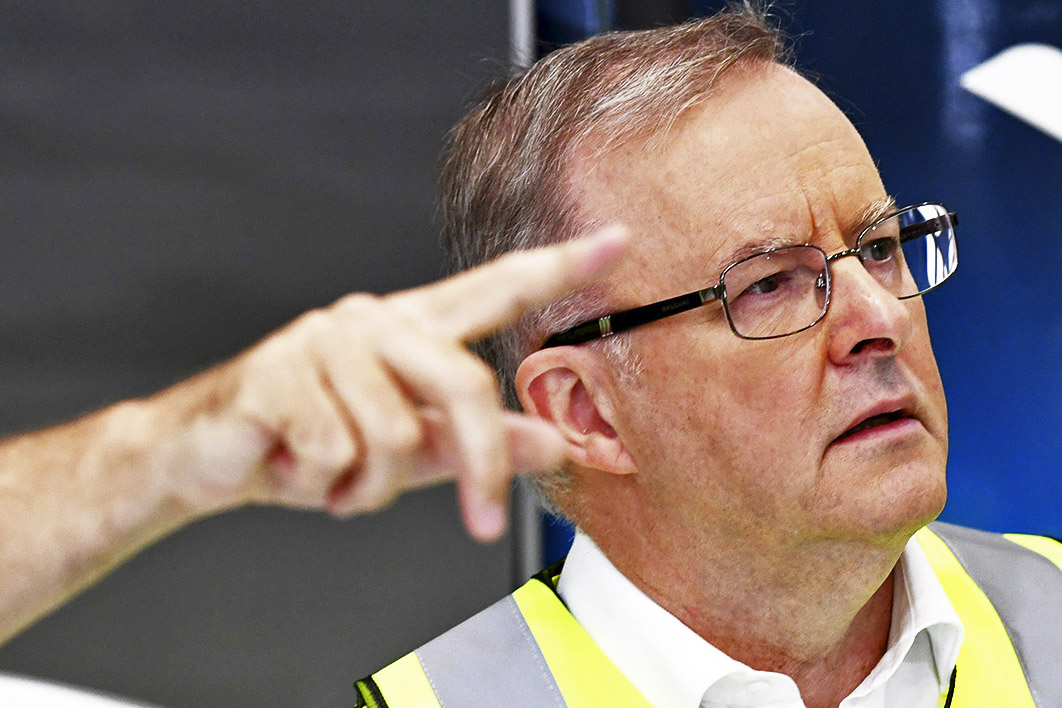So much for “small target.” Former leader Bill Shorten need no longer complain (with a dollop of chutzpah) about his successor’s “tiny agenda.” For Labor has decided to put workplace relations front and centre of the next election campaign — and this time it’s promising substantial change.
Last week opposition leader Anthony Albanese unveiled “Labor’s Secure Australian Jobs Plan.” A lot of it was pretty vague, but on Sunday’s Insiders ACTU secretary Sally McManus put some flesh on the bones.
After Albanese’s press release, but before his speech, industrial relations minister Christian Porter threw up a quick back-of-the-napkin, worst-case estimate of a hit to business of “up to $20 billion.” Leaving aside the dodgy assumptions, it was pretty lame stuff — a $20 billion transfer from bosses to employees, so what? — but eventually the Coalition government and its media mates will find their line and length.
Then they’ll be enjoying a smorgasbord of political opportunities, endlessly gorging on the details — or even better, lack of details — of Labor’s brave new world.
As with Shorten’s housing and franking credits policies two years ago, the argument here is not whether the policies themselves are “good” or “bad.” The question is whether it is wise for the opposition to take them to the next election.
And the answer is a loud no. It’s politically crazy. In the “vibe” sense, it’s easily depicted as Labor and the unions seriously intervening in your workplace, and indeed your life. Some will look forward to that, but for many it’ll just be stress-inducing, and a stressed voter is a dangerous thing.
In the micro, the parts about the “gig economy” present a particularly juicy target. McManus told David Speers it would be up to the Fair Work Commission to “say that a sector are employees rather than being their own small business.” They would then “get all the basic rights of other workers [such as] minimum wage, sick pay if they’re working regular hours, the right to bargain.”
Labor might reckon that leaving it to the “independent umpire” will let it wiggle out of providing specifics, but in reality it leaves a lot of space for all sorts of wild conjecture.
So for starters… is this the end of Uber? Or does it just mean a big hike in fares? And if Uber is regulated, why not taxi drivers, who have never enjoyed these “basic rights”? Up go taxi fares, too. Meal deliveries will cost more, of course, but how much more? And how about the growing parcel delivery sector? You can bet even some gig workers themselves will willingly appear in news reports explaining that they’d prefer things remain the way they are. And with these jobs over-represented by non-citizens (and hence non-voters), there aren’t even many votes in it.
What possessed the federal opposition to plonk this on the table? Is it about reinforcing Albanese’s position? Over the past decade we’ve witnessed many times how leaders under pressure often seek validation from their party base, which further estranges them from the mainstream. Is the idea that Labor needs to “stand for something!” or (God help us) reaffirm that it’s “true Labor,” as if that’s what the electorate is demanding. (It’s truer to say Labor does well when people see it as not just the same old party.)
Do they yearn for a repeat of the glorious 2007 result, when the workers rose up against the Howard government’s WorkChoices policy?
I’m a sceptic about whether that policy, and the ACTU’s Your Rights at Work campaign, was a major driver of that outcome thirteen years ago. But even if (like most political observers) you buy into it, the theme then was to retain the status quo or, for some employees, return to the status quo ante. It was a vote against change.
Maybe the policy is a union condition for continued support for the leader. If so, don’t they want Labor to form government? Couldn’t they have waited until after the election before presenting their wish list?
Whatever the reason, brush up on your IR terminology. It’s going to be that kind of campaign, with nitpick after nitpick directed at Labor MPs and union leaders.
And if Scott Morrison has been wondering what on earth he was going to campaign on, he has his answer. The Coalition, the conservative media and business groups now have something to sink their teeth into. •





